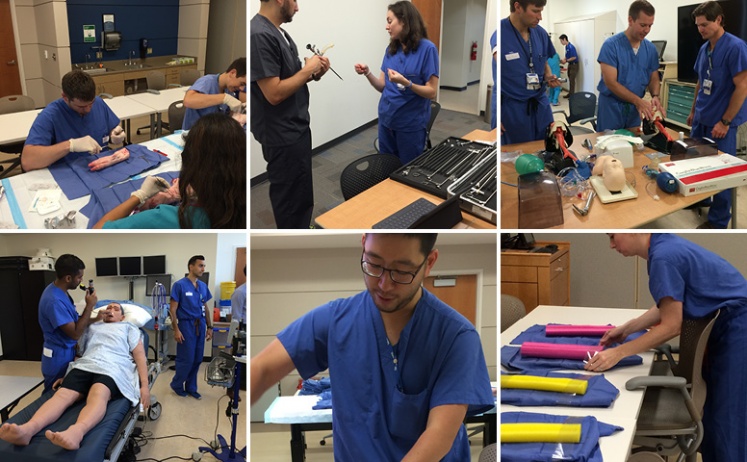
Allergy Course
Trainees get exposure to allergy testing throughout their training and PGY3 residents attend an American Academy of Otolaryngic Allergy (AAOA) course to further deepen their understanding of immunologic conditions.
Craniomaxillofacial Trauma Course
The objectives for this course are to provide the necessary understanding of anatomy and treatment protocols for residents involved in the management of Craniomaxillofacial (CMF) Trauma, specifically focusing interest to residents in Plastic & Reconstructive Surgery, Otolaryngology - Head & Neck Surgery, Oral & Maxillofacial Surgery, Oculoplastics, and Neurosurgery. These criteria will be reinforced with didactic presentations, model surgery on plastic skulls, interactive case review discussions, and cadaveric tutorials. The principles of soft tissue management and its role in the treatment of CMF trauma will be reinforced in the laboratory environment, including the principles of rigid fixation as demonstrated by the use of conventional surgical hardware.
Duke Emergency Skills Course
This course is designed to expose and educate the PGY-1 and PGY-2 residents in airway and ED case management, rigid bronchoscope assembly and use to remove foreign bodies, suturing 201, cricothyrotomy/tracheostomy, managing complex scenarios, and emergency cases. The residents will also learn correct placement of PETs using 3D-printed ears in the temporal bone lab so residents will get experience using the microscope.
Head and Neck Cadaver Course
The Head and Neck Cadaver Course is held in the temporal bone lab. The course focuses on head and neck surgery, facial plastics, and sinus cases. This wet lab is held annually to update residents on common head and neck surgery procedures, including neck dissection, thyroidectomy, partoidectomy, sinus surgery, and rhinoplasty. Junior residents are paired with senior residents who take them through these operative interventions. Subspecialty faculty are present to supervise and guide the dissections. At the end of the day, the residents harvest the temporal bones.
Resident Injection Clinic
Under the supervision of the facial plastic & reconstructive surgery faculty, the residents receive hands-on opportunities to inject aesthetic neuromodulators and fillers in volunteer patients. This course is held 2-3 times a year.
Temporal Bone Dissection Course
The Duke Department of Head and Neck Surgery & Communication Sciences Annual Resident Temporal Bone Dissection Course is held annually at Duke University Hospital. The purpose of this course is to provide residents-in-training education in temporal bone anatomy, hearing loss, and chronic otitis media.
Our expert panel of faculty speakers provides updated information and instruction pertaining to a variety of surgical procedures, including tympanoplasty, mastoidectomy, cochlear implantation, stapedectomy, balloon eustachian tuboplasty, and bone conduction hearing devices. The course will consist of didactic lectures and hands-on temporal bone dissections.
UNC–Duke Point-of-Care Ultrasound Course
The course is designed to help familiarize the learner with the basics of ultrasound (US) technology; the identification of normal, benign, and malignant anatomy on US (focusing on the thyroid); and the fine-needle aspiration (FNA) technique. The half-day course is roughly split between didactic lectures and hands-on time with the US with patient volunteers and models to practice FNA.